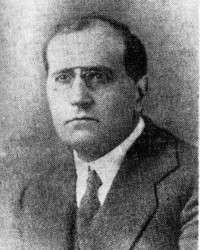Adriano Tilgher (philosopher)
Adriano Tilgher (8 January 1887 – 3 November 1941) was an Italian philosopher and essayist.

Biography
Tilgher was born in Resina (now Ercolano, Campania).
After studying law, he dedicated himself to journalism and essay writing. He was a theatre critic for various daily Roman newspapers between 1915 and 1925, proving himself a sharp interpreter of dramatic texts. He is known for his view of the theatre of Luigi Pirandello, which he interpreted as an expression of the contrast between Life (la Vita) and Form (la Forma), a view Pirandello adopted as his own. However, despite his friendship with Pirandello, Tilgher broke with him when Pirandello became a member of the Fascist Party.[1]
In numerous works containing philosophical content, he revealed his own relativistic and irrational understanding of life and refuted all types of metaphysics. He wrote the book "Storia del concetto di lavoro nella civiltà occidentale (homo faber)", Rome 1924 (reprinted) 1944 and Bologna 1983; English translation (by Dorothy Canfield Fisher); "Work, what it has meant to men through the ages", New York 1931 (reprinted 1958, 1977).
He died in Rome in 1941.
Works
- Relativisti contemporanei (1923), Rome: Libreria di scienze e lettere
References
- Ernst, von Glaserfeld (2009). "Relativism, Fascism, and the Question of Ethics in Constructivism" (PDF). Constructivist Foundations. 4 (3): 117–120.